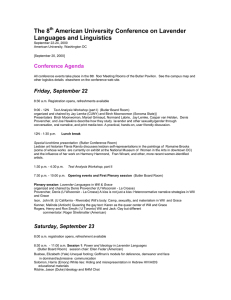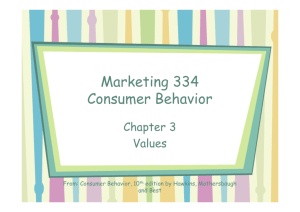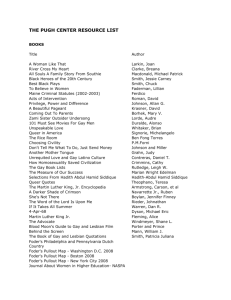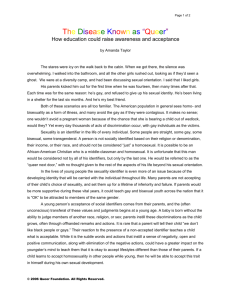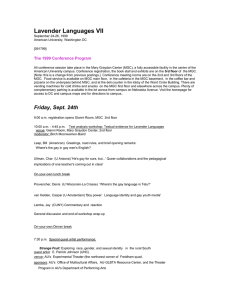The VIIth American University Conference on Lavender Languages and Linguistics
advertisement
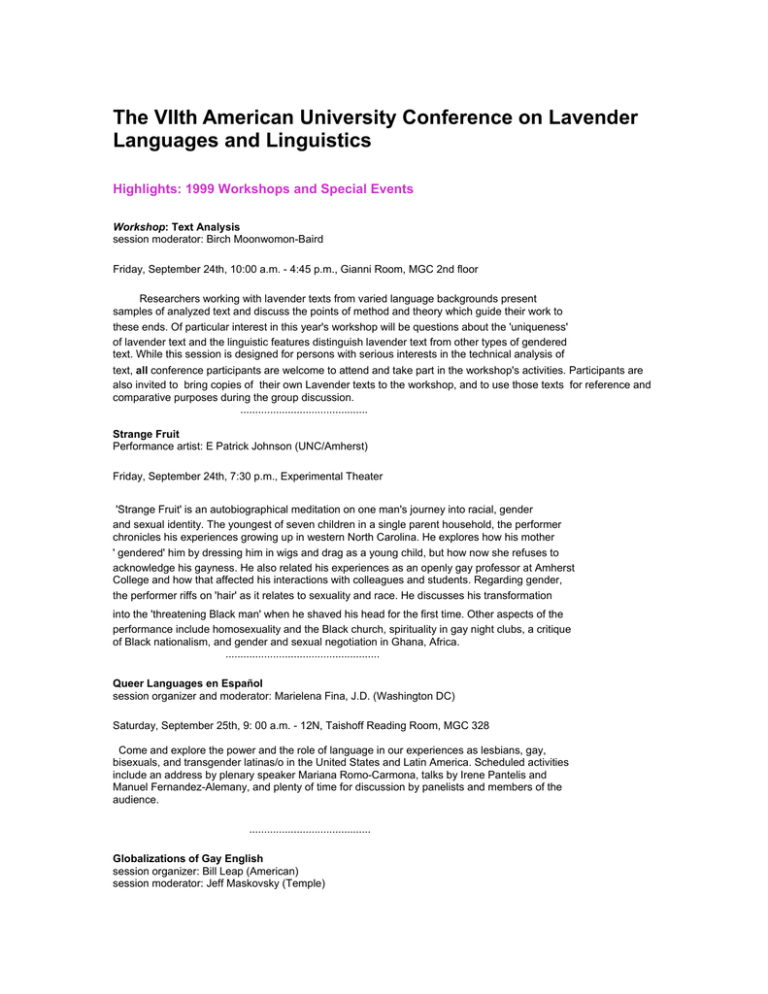
The VIIth American University Conference on Lavender Languages and Linguistics Highlights: 1999 Workshops and Special Events Workshop: Text Analysis session moderator: Birch Moonwomon-Baird Friday, September 24th, 10:00 a.m. - 4:45 p.m., Gianni Room, MGC 2nd floor Researchers working with lavender texts from varied language backgrounds present samples of analyzed text and discuss the points of method and theory which guide their work to these ends. Of particular interest in this year's workshop will be questions about the 'uniqueness' of lavender text and the linguistic features distinguish lavender text from other types of gendered text. While this session is designed for persons with serious interests in the technical analysis of text, all conference participants are welcome to attend and take part in the workshop's activities. Participants are also invited to bring copies of their own Lavender texts to the workshop, and to use those texts for reference and comparative purposes during the group discussion. ........................................... Strange Fruit Performance artist: E Patrick Johnson (UNC/Amherst) Friday, September 24th, 7:30 p.m., Experimental Theater 'Strange Fruit' is an autobiographical meditation on one man's journey into racial, gender and sexual identity. The youngest of seven children in a single parent household, the performer chronicles his experiences growing up in western North Carolina. He explores how his mother ' gendered' him by dressing him in wigs and drag as a young child, but how now she refuses to acknowledge his gayness. He also related his experiences as an openly gay professor at Amherst College and how that affected his interactions with colleagues and students. Regarding gender, the performer riffs on 'hair' as it relates to sexuality and race. He discusses his transformation into the 'threatening Black man' when he shaved his head for the first time. Other aspects of the performance include homosexuality and the Black church, spirituality in gay night clubs, a critique of Black nationalism, and gender and sexual negotiation in Ghana, Africa. .................................................... Queer Languages en Español session organizer and moderator: Marielena Fina, J.D. (Washington DC) Saturday, September 25th, 9: 00 a.m. - 12N, Taishoff Reading Room, MGC 328 Come and explore the power and the role of language in our experiences as lesbians, gay, bisexuals, and transgender latinas/o in the United States and Latin America. Scheduled activities include an address by plenary speaker Mariana Romo-Carmona, talks by Irene Pantelis and Manuel Fernandez-Alemany, and plenty of time for discussion by panelists and members of the audience. ......................................... Globalizations of Gay English session organizer: Bill Leap (American) session moderator: Jeff Maskovsky (Temple) Saturday, September 25th, 3:15 - 6:30 p.m., Weschler Theater, MGC 3rd floor What role does language play in the worldwide circulation of gay culture? In what ways do the varieties of 'gay English' which have emerged in North Atlantic settings in recent years continue become implicated in these transnational flows? How does the introduction of an English-based gayspeak articulate with/compete with/disrupt communicative practices already associated with same-sex identities and desires in other locations? What claims to sexual citizenship and other political messages are associated with expressions of same-sex identities and desires in gay English vs. in situ, indigenous lavender codes? What forms of linguistic resistance are emerging in these locations, in response to gay English 'spread'? And what economic/political processes are favoring gay English, and placing local codes and local forms of resistance at disadvantage? Researchers who are exploring lavender languages in a broad range of international settings will speak to the issues raised by these questions, and discuss their observations with each other and with the audience. ............................................................ Special presentation: Lexicon and lesbian lect presenter: Birch Moonwomon-Baird Sunday, September 26th, 11:15 - 11:45 a.m., Taishoff Reading Room, MGC 328 In different eras of the construction of lesbianism in this century, words like 'lesbian', 'homosexual', 'gay', 'gay woman', and 'dyke' have had different semantics and have been used with different degrees of comfort and openness by same-sex/same gender oriented women. In texts of one-on-one interviews and taped small-group discussions collected during a sociolinguistic and ethnographic study of lesbian lives and language use, I find metacommentary on these terms that aids an understanding of women's knowledge of these terms and of their historical places. In this presentation, I illustrate a multipart analysis, some of which is study of contexted and some of decontexted material. The analysis reveals that the semantics each speaker attaches to the terms studied and her stated comfort or discomfort with the terms are part of her personal, ideologized construction of her lesbianism, and reflect her stance toward the politics of lesbianism in her own generational unit and, importantly, other political generations. .................................. Workshop: Analysis of Lavender Conversation session organizer and moderator: Brian Heisterkamp (Arizona State U) Sunday, September 26th, 11:45 a.m. - 1:15 p.m., Taishoff Reading Room, MGC 328 The conversation analysis session will include the examination of naturally occurring gay/lesbian/bi conversational interactions. Each presenter engages in a different form of discourse analysis including conversation analysis and anthropological linguistics. Audience participants will have the opportunity to listen to the data and engage in unstructured analysis. Findings will also be discussed by each presenter. Audience members who have collected gay/lesbian/bi conversational data are encouraged to bring tapes/transcripts with them if they are interested in having audience members utilize their data for an informal data analysis session. This will be a relaxed session during which participants can learn about the analysis of queer conversations from one another. .............................................................. Queer Speaking - An artist describes his work Ira Tattelman, (Independent scholar, Washington, DC) Sunday, September 26th, 2:15-3:00 p.m., Taishoff Reading Room,. MGC 328 I am a queer artist, architect and independent scholar. The presence of my queer projects serves to redefine space and bring new meaning and debates to the public realm. If we consider the neglected public spaces of our urban areas as emblematic of the queer community - outcast, forgotten different - then the reclamation of those spaces, the infusion of energy into what is thought of as abandoned, allows the queerness of public space to emerge. The improvisations that I create on the streets subvert the organization of space and recreate habitable space. They deform and reform boundaries, discourses, models and stereotypes. These temporary structures create penetrable boundaries by layering new systems onto existing ones. They often suggest shelter and invite enhanced activities within them. Most of these projects are flexible. They can be reconfigured or removed when circumstances change. They are also constructed without concern for permits and codes. Their creation is a form of resistance to the prescribed distribution of power. I use these projects to point out the plurality of forms and frames in which we reside. How we respond to our landscapes, how we locate ourselves within it and what actions and divisions we find embedded in it, help define our iterations. Queer thinking is located inside, outside and at the margins of public space. I use my projects to examine those settings. ......................................... Language and Lavender Space in Washington DC Session organizer and moderator: Mindy Michels (American) Sunday, September 26th, 3:00-5:00 p.m., Taishoff Reading Room, MGC 328 A now-annual conference event, this Sunday afternoon session brings together researchers and community activities to exchange ideas about the places and spaces claimed and contested as lgbtq places and spaces by lesbians, gay men, bisexuals, transgendered persons, and queers in the DC area. Participants include: Brett Beemyn (Western Illinois U), Alan Hersker (American), Loraine Hutchins (DC activist) Bill Leap (American), Mindy Michels (American), Ron Simmons (Us Helping US), Lili Vincenz (DC activist), and Sheila Wise (American).
